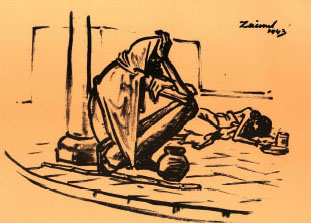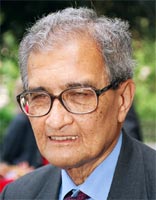
THE GREAT HOLOCAUST OF BENGAL
Author - Anil Chawla

|
THE GREAT HOLOCAUST OF BENGAL
|

History is written by those who win a war and not by the losers. No wonder, the history of Second World War is written by British and American authors. We are told that the war was necessary to eliminate the evil of Nazism and Hitler from the earth. Nazism and Hitler are painted as devils because they killed six million Jews (a figure put out by British and Jew historians and disputed by many).
The last chapter in the history of Second World War was written in early October 1945 at the famous Nuremberg trial, when the four prosecuting nations -- the United States, Great Britain, France and Russia -- issued an indictment against 24 men and six organizations. The individual defendants were charged with the systematic murder of millions of people.
Sixty years after the end of the war, time has come to reopen the case and institute a fresh Nuremberg trial - this time against one of the prosecuting nations -- Great Britain -- for systematic and intentional murder of millions of people. This genocide was not confined to the Second World War. In fact, only its last episode was played out during the war. The ghastly genocide, which used hunger and starvation as tools, lasted for about eighteen decades and was carried out in Bengal, India (at present Bengal is partly in India and partly in Bangladesh) by the British colonial masters claiming about thirty million victims.
It started in 1770 with a big bang, when approximately one third of the total population of Bengal died because of a drought. About 10 million people died! East India Company, which had occupied the country five years earlier, did not even once attempt to introduce any measures of aid worth mentioning. British officers in India were happily reporting to their bosses in London about having maximized their profit through trading and export of food. (Incidentally, Bankim Chandra Chatterjee, the prophet of Indian nationalism, wrote his celebrated novel "Anandamath" with the battle cry 'Bandemataram' in the context of the agony evoked by the ravages of the famine of 1770.)
It must be mentioned here that Bengal is a land of rivers and most fertile land of Ganges delta. Bengal was a granary of India till British came in. Every village had, and still has, a pond, which has fishes that can feed the village even when there is no rice. It needed British intervention to convert the lush green land of Bengal into famine-starved land.
 Bengal had 30 or 40 famines (depending on how one defines famine)
during 182 years of British rule in Bengal. There are
no reliable accounts of the number of people who died in these famines.
We have only the figures put out by British colonialists. But even given the
limited data availability, once can see the barbaric face of British
colonialism in India.
Bengal had 30 or 40 famines (depending on how one defines famine)
during 182 years of British rule in Bengal. There are
no reliable accounts of the number of people who died in these famines.
We have only the figures put out by British colonialists. But even given the
limited data availability, once can see the barbaric face of British
colonialism in India.
The last big famine in Bengal occurred between 1942 and 1945. At least four million people died during these three years. Some scholars believe that the number of dead was much higher (remember that the figure of four million is based on British sources). Notwithstanding the controversy about the number of dead, it is widely accepted that the famine was man-made. Nobel laureate, Amartya Sen, has demonstrated quite convincingly that the famine deaths were caused by British policies and not by drastic slump in food production.
The following facts deserve attention:
 Given a choice, I would rather die in a gas chamber than die of starvation
begging on the streets. Viewed from this perspective, Hitler appears humane
and even angelic, while Churchill puts even the devil to shame. The
thirty million men, women and children who died slow, painful deaths
in the villages of Bengal were not enemies of the British Empire.
They had done nothing to deserve the cruel fate. Howsoever much
one might disagree with Hitler, at least in his own warped logic,
he had a reason to hate Jews. British Government and Churchill
did not even have such a fig leaf of distorted logic to justify
their cruel barbaric act.
Given a choice, I would rather die in a gas chamber than die of starvation
begging on the streets. Viewed from this perspective, Hitler appears humane
and even angelic, while Churchill puts even the devil to shame. The
thirty million men, women and children who died slow, painful deaths
in the villages of Bengal were not enemies of the British Empire.
They had done nothing to deserve the cruel fate. Howsoever much
one might disagree with Hitler, at least in his own warped logic,
he had a reason to hate Jews. British Government and Churchill
did not even have such a fig leaf of distorted logic to justify
their cruel barbaric act.
 Amartya Sen has used the Bengal famine to justify democracy and run
down dictatorships. The fact is that Churchill was democratically
elected by British people. After independence, from 1947 till date,
East Bengal (presently known as Bangladesh) has been ruled by
dictators for many years. Yet, during the past five and a half
decades, the number of starvation deaths in East Bengal
(or West Bengal) is not even one per cent of the number
of people that died of starvation during the half-century
before independence. The issue, obviously, is not dictatorship
versus democracy.
Amartya Sen has used the Bengal famine to justify democracy and run
down dictatorships. The fact is that Churchill was democratically
elected by British people. After independence, from 1947 till date,
East Bengal (presently known as Bangladesh) has been ruled by
dictators for many years. Yet, during the past five and a half
decades, the number of starvation deaths in East Bengal
(or West Bengal) is not even one per cent of the number
of people that died of starvation during the half-century
before independence. The issue, obviously, is not dictatorship
versus democracy.
We are also told that the rulers of Bengal, before the British arrived, were self-centered despots, who did not care about their people's well being and were spoilt by luxury. British take pride in the fact that they brought 'good governance' and 'rule of law' to India, starting from Bengal and spreading to the rest of the country. In spite of all the alleged misrule that the Indian rulers of pre-British era indulged in, there is absolutely no historical account of any major famine in Bengal prior to the arrival of British in Bengal.
Academicians have a tendency to miss the holistic reality when they go hammer and tongs over fine details. Most academic debates about Bengal Famine have missed the most essential aspect - criminal act of the British Government. There is a tendency to study the Bengal famine in terms of parameters, which were internal to Bengal, like food supply, disease history of rice, inflation economics, democracy as a system of governance, weather analysis and many such wonderful terms. All such studies treat the famine as if it was a product of some systemic internal parameters peculiar to Bengal; and all that is needed is to study the parameters with a view to ensure that the same do not recur. This is a wrong premise.
 Bengal was a victim of a criminal act perpetrated for more than one
and three quarters of a century. British establishment indulged in
brutal genocide in Bengal, at times to further their own interests
and at other times out of sheer negligence of their duties. In
either case, the British Government stands guilty of the worst
crime in recent human history.
Bengal was a victim of a criminal act perpetrated for more than one
and three quarters of a century. British establishment indulged in
brutal genocide in Bengal, at times to further their own interests
and at other times out of sheer negligence of their duties. In
either case, the British Government stands guilty of the worst
crime in recent human history.
The Holocaust in Germany was a minor event compared to what the British did to a people, who trusted them and were loyal to them. Nazis have been accused and convicted of the Holocaust in Germany. Even today, there are attempts to hunt down ex-Nazis and bring them to justice. A few weeks ago, a court awarded compensation to a Holocaust victim.
Is it not time that the descendants of the victims of The Great Holocaust of Bengal sought compensation from the present Government of the United Kingdom? Is it possible to initiate a criminal case against Winston Churchill and all those who were in power during 1942-45 (or during 1765-1947) in British Government? Is that too much to ask for? Do you believe that the systematic murder of six million white-skinned Jews was a crime worthy of punishment, while the killing of thirty million black-skinned people of Bengal does not even deserve a footnote in history?
 The least that people of India and Bangladesh can do is to construct
a memorial in the memory of millions who died at the hand of a cruel
barbaric monster. Let us at least shed a tear for them! Let us at
least rewrite the history!
The least that people of India and Bangladesh can do is to construct
a memorial in the memory of millions who died at the hand of a cruel
barbaric monster. Let us at least shed a tear for them! Let us at
least rewrite the history!
Anil Chawla
4 April 2005
Acknowledgement: The author is indebted to many scholars
who have studied Bengal Famine. For the sake of brevity and readability,
detailed references are not provided. However, special thanks are due
to "The Unknown Famine Holocaust - About the Causes of Mass Starvation
in Britain's Colony of India 1942-1945" by Wolfgang
Pfitzner, The Revisionist 1(1) (2003), pp. 71-75;
http://www.vho.org/tr/2003/1/Pfitzner71-75.html.
Sketches given above are by Zainul Abedin (1914-1976).
Please write to me your comments about the above article.
 anil@samarthbharat.com
anil@samarthbharat.com
 hindustanstudies@yahoo.co.in
hindustanstudies@yahoo.co.in

ANIL CHAWLA is an engineer (and now a lawyer too) by qualification but a philosopher by vocation and a management consultant by profession.

Website developed and managed by

MF-104, Ajay Towers, E5/1 (Commercial),
Arera Colony,
Bhopal - 462016 INDIA


© All Rights Free